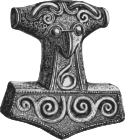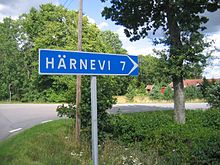- List of names of Freyja
-
In Norse mythology, Freyja (Old Norse the "Lady") is a goddess associated with love, beauty, fertility, gold, seiðr, war, and death. Freyja is the owner of the necklace Brísingamen, rides a chariot driven by two cats, owns the boar Hildisvíni, possesses a cloak of falcon feathers, and, by her husband Óðr, is the mother of two daughters; Hnoss and Gersemi.
Freyja is attested as having nine additional names; Gefn, Hörn, Mardöll, Skjálf, Sýr, Thröng, Thrungva, Valfreyja, and Vanadís. Some of these names have posed etymological problems for scholars, while others are more straightforward to translate. Most of Freyja's names point to apparent attributes and associations, and at least one, Hörn, appears in place names in what is now Sweden.
An explanation is presented for Freyja's many names in the Prose Edda book Gylfaginning, where the enthroned figure of High details that Freyja is married to the god Óðr, who goes on long travels. While Óðr is absent, Freyja stays behind and, in her sorrow, weeps tears of red gold. High says that Freyja has many names because she adopted them while looking for Óðr and traveling "among strange peoples".[1]
Contents
Names
Name (Old Norse) Name meaning Attestations Notes Gefn 'the giver'[2] Gylfaginning, Nafnaþulur The name Gefn likely means "she who gives (prosperity or happiness) and is generally considered connected to the goddess name Gefjon, but the etymology of the name Gefjon has been a matter of dispute. The root Gef- in Gef-jon is generally theorized as related to the root Gef- in the name Gef-n."[3] The connection between the two names has resulted in etymological results of Gefjun meaning "the giving one."[4] The names Gefjun and Gefn are both related to the Matron groups the Alagabiae or Ollogabiae.[5] Scholar Richard North theorizes that Old English geofon and Old Norse Gefjun and Freyja's name Gefn may all descend from a common origin; gabia a Germanic goddess connected with the sea, whose name means "giving".[6]
Hörn 'flaxen'(?)[2] Gylfaginning, Nafnaþulur Appears in the Swedish place names Härnevi and Järnevi, stemming from the reconstructed Old Norse place name *Hörnar-vé (meaning "Hörn's vé").[7] In addition, the name Hörn also appears as the name of a troll-wife in Nafnaþulur.[8] Mardöll 'sea-brightener'(?)[2] or possibly 'the one who makes the sea swell'[9] Gylfaginning, Nafnaþulur May be connected to the god name Heimdallr.[9] Skjálf 'shaker'[2] Nafnaþulur Also the name the daughter of a Finnish king in Ynglinga saga. Due to necklace imagery in the Finnish Skjálf's tale (Freyja herself owns Brísingamen) there may be a connection between the two.[10] Sýr 'sow'[2] Gylfaginning, Skáldskaparmál, Nafnaþulur The pig was an important symbol of the Vanir and sacrificial practices (blót) associated with the group, particularly in association with Freyja and her brother Freyr.[11] Thröng 'throng'[2] Skáldskaparmál Thrungva 'throng'[2] Nafnaþulur Valfreyja 'Lady of the Slain' or "Freyja of the Slain'[2] Skáldskaparmál Vanadís 'the dís of the vanir'[2] Skáldskaparmál The name "van-child" ('child of the Vanir') for "boar" may be connected.[12] See also
- Gullveig, a thrice-burnt, thrice-reborn female who various scholars identify as Freyja and as playing a major role in sparking the Æsir–Vanir War
Notes
References
- Davidson, Hilda Ellis (1998). Roles of the Northern Goddess. Routledge. ISBN 0-415-13611-3
- Faulkes, Anthony (Trans.) (1995). Edda. Everyman. ISBN 0-460-87616-3
- North, Richard (1998). Heathen Gods in Old English Literature. Cambridge University Press. ISBN 0521551838
- Orchard, Andy (1997). Dictionary of Norse Myth and Legend. Cassell. ISBN 0 304 34520 2
- Simek, Rudolf (2007) translated by Angela Hall. Dictionary of Northern Mythology. D.S. Brewer ISBN 0-85991-513-1
Norse paganism Deities,
heroes,
and figuresOthersAsk and Embla · Dís (Norns · Valkyries) · Dwarf · Einherjar · Elves (Light elves · Dark elves) · Fenrir · Hel · Jörmungandr · Jötunn · Sigurd · Völundr · Vættir
Locations Asgard · Bifröst · Fólkvangr · Ginnungagap · Hel · Jötunheimr · Midgard · Múspellsheimr · Niflheim · Valhalla · Vígríðr · Wells (Mímisbrunnr · Hvergelmir · Urðarbrunnr) · YggdrasilEvents Sources Society See also Categories:- Germanic paganism and mythology lists
Wikimedia Foundation. 2010.

